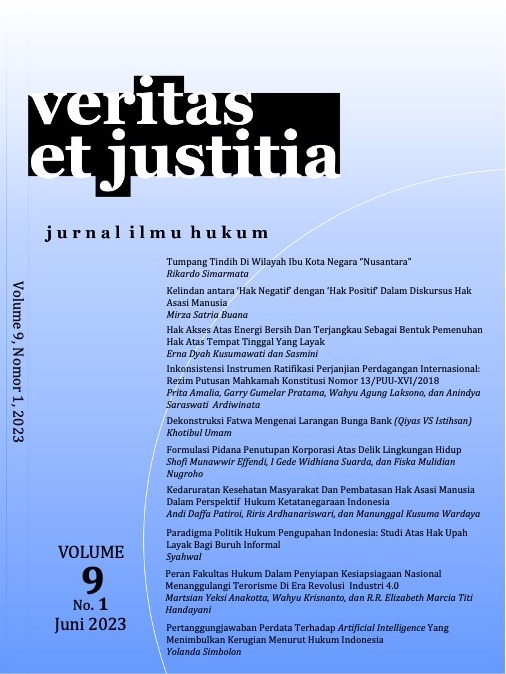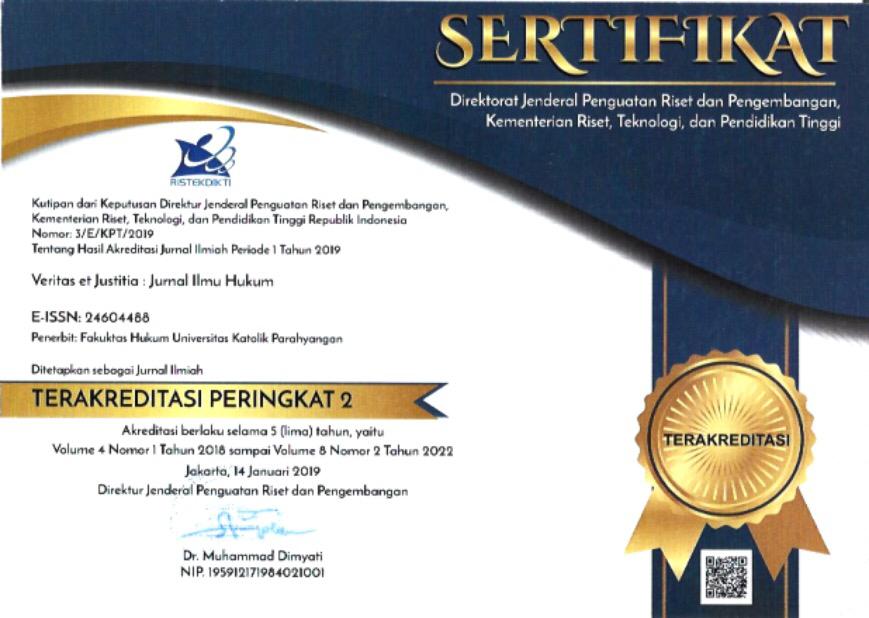HAK AKSES ATAS ENERGI BERSIH DAN TERJANGKAU SEBAGAI BENTUK PEMENUHAN HAK ATAS TEMPAT TINGGAL YANG LAYAK
DOI:
https://doi.org/10.25123/vej.v9i1.6111Keywords:
access to clean energy; human rights; right to adequate housing;Abstract
Access to clean and affordable energy has become a persistent problem faced by countries worldwide. The peak increase in oil prices experienced in a few decades has made it difficult for the low incomes to access clean energy. At present, many people in rural areas still use wood as fuel for cooking. Indoor wood-burning activities might cause air pollution and triggers respiratory problems. Employing a conceptual approach, this article examines the debate on the concept of moral and legal right of the right to clean and affordable energy under international law. Moreover, it analyses the correlation and the importance of such right for the fulfilment of the right to adequate housing and how states adhere to it. The research finds that there is yet any legal instruments directly recognising the right to clean and affordable energy. Nevertheless, there is plenty recognition of the importance of energy as vital element for fulfilling other human rights, such as the right to adequate housing. It is found that states have recognised the utmost influence of energy on achieving economic and social goals. However, current state practices heavily depend on soft law and show their commitment to facilitate and fulfil the moral right to clean and affordable energy. Integrating human rights principles, norms, and standards into legal rights and policies on energy development plan are indeed crucial. Such integration will enable the recognition of energy as an entitlement, which will place energy as a precondition that must be provided as essential services to enable adequate life of inhabitants.
References
Buku:
Adam Etinson, Human Rights: Moral or Political?, Oxford University Press, Oxford, 2018
Anita Rønne, Smart Cities and Smart Regulation: Accelerating Innovative Renewable Technologies in Energy Systems to Mitigate Climate Change, dalam Donald Zillman and others (eds), Innovation in Energy Law and Technology: Dynamic Solutions for Energy Transitions, Oxford University Press, Oxford, 2018
Christine Chinkin, Normative Development in the International Legal System, dalam Dinah Shemton (ed), Commitment and Compliance: The Role of Non-binding Norms in the International Legal System, Oxford University Press, Oxford, 2002
David B Hunter, The Hard Choice for Soft Commitments in the Climate Change Regime dalam Daniel Dradlow dan David Hunter (eds), Advocating Social Change through International Law: Exploring the Choice between Hard and Soft International Law, Brill Publishers, Leiden, 2019
Edith Brown Weiss and Dinah Shelton, Conclusions: Understanding Compliance with Soft Law, dalam Dinah Shelton (ed), Commitment and Compliance: The Role of Non-binding Norms in the International Legal System, Oxford University Press, Oxford, 2002
Fatih Birol, Achieving Energy for All Will Not Cost the Earth, dalam Antoine Halff, Benjamin K. Sovacool and Jon Rozhon (eds), Energy Poverty: Global Challenges and Local Solutions, Oxford University Press, Oxford, 2014
Frauke Urban, Energy and Development, Routledge, New York, 2020
H.K. Jacobson, dan E. Brown Weiss, Assessing the Record and Designing Strategies to Engage Countries, dalam E. Brown Weiss and H.K. Jacobson (ed), Engaging Countries: Strengthening Compliance with International Environmental Accords, The MIT Press, Massachussets, 1998
Stephen Karekezi, et. al., Energy, Poverty, and Development, dalam Global Energy Assessment Writing Team (Authors), Global Energy Assessment: Toward a Sustainable Future, Cambridge University Press, Cambridge, 2012
Jurnal dan Publikasi:
Adrian J Bradbrook and Judith G Gardam, Placing Access to Energy Services within a Human Rights Framework, Human Rights Quarterly, Vol. 28, No. 2, 2006
Bethel Tarekegne, Just Electrification: Imagining the Justice Dimensions of Energy Assess and Addressing Energy Poverty, 70 Energy Research and Social Science, Vol. 70, No. 101639, 2020
Elena Rostislavovna Schislyaeva and Olga Anatolievna Saychenko, Evaluation of Post Covid-19 Energy Poverty and Global Trading Impact on Energy Affordability, Front. Energy Res, Vol. 10, No. 971122, 2022
Fatih Birol, Energy Economics: A Place for Energy Poverty in the Agenda? 28 The Energy Jurnal, Vol. 28, No. 3, 2007
Frank Biermann, et. al., Scientific Evidence on the Political Impact of the Sustainable Development Goals, Nature Sustainability, Vol. 5, 2022
IISD, Summary of the Second Session of the Ad Hoc Intergovernmental Group of Experts on Energy and Sustainable Development: 26 February- 2 March 2001, Earth Negotiations Bulletin, Vol. 5, No. 163, 2001
Ioanna Kyprianou and Despina Serghides, Dealing with Energy Poverty in Cyprus–an Overview, International Journal of Sustainable Energy, Vol. 39 No. 4, 2020
Harold Koh, A World Transformed, Yale Journal of International Law, Vol. 20, 1995.
Jesse Tomalty, Justifying International Legal Human Rights, 30 Ethics & International Affairs, Vol. 30, No. 4, 2016.
John Tasioulas, Human Rights, Legitimacy, and International Law, The American Journal of Jurisprudence, Vol. 58, No. 1, 2013
Marko Divac Öberg, The Legal Effects of Resolutions of the UN Security Council and General Assembly in the Jurisprudence of the ICJ, 16 European Journal of International Law, Vol. 16, No. 5, 2005
Margaretha Wewerinke-Singh, a Human Rights Approach to Energy: Realizing the Rights of Billions within Ecological Limits, Review of European, Comparative & International Environmental Law, Vol. 31, No. 1, 2021
Marlies Hesselman, Anaïs Varo, Senja Laakso, The Right to Energy in the European Union, ENGAGER COST: European Energy Poverty, Policy Brief, No. 2, 2019
Michael da Silva, Legal Doctrine as Human Rights ‘Practice’, Global Constitutionalism, Vol. 12, No. 1, 2023
Michael J. Perry, The Morality of Human Rights, San Diego Law Review, Vol. 50, 2013
Obed Asamoah, The Legal Effect of Resolutions of the General Assembly, Colum. J. Transnat'l L., Vol 3, 1963-1964.
Peter Jones, Moral Rights, Human Rights and Social Recognition, Political Studies, Vol. 61. 2013
Praveen Kumar, Energy Access and Women's Empowerment, Nat Energy, Vol.7, 2022
Stephen M. Schwebel, The Effect of Resolutions of the U.N. General Assembly on Customary International Law, Proceedings of the Annual Meeting (American Society of International Law), Vol. 37, April 26 - 28, 1979
Stephen R. Tully, The Contribution of Human Rights to Universal Energy Access’ 4 (2006) Northwestern Journal of International Human Rights, Vol. 4, No. 3, 2006
Wuri Virgayanti, Pengakuan Akses Terhadap Jasa Energi Khususnya Listrik sebagai Hak Asasi Manusia, Legislasi Indonesia, Vol.14, No. 2, 2017
Instrumen Hukum Internasional dan Dokumen PBB:
Commission on Environment and Development, Our Common Future 8 (1987)
Committee on Economic, Social and Cultural Rights (CESCR), Conclusions and Recommendations of the Committee on Economic, Social and Cultural Rights, Dominican Republic, U.N. Doc. E/C.12/1994/15, 19 December, 1994
CESCR, Revised General Guidelines Regarding the Form and Contents of Reports to be Submitted by States Parties under Articles 16 and 17 of the ICESCR, 3, U.N. Doc. E/C.12/1991/1, 17 June, 1991
CESCR, Poverty and the International Covenant on Economic, Social and Cultural Rights, U.N. Doc. E/C.12/2001/10, 10 May, 2001
International Covenant on Economic Social and Cultural Rights (ICESCR), 16 December, 1966
Kyoto Protocol to the United Nations Framework Convention on Climate Change, 11 December, 1997
U.N. Commission on Human Rights, Report of the Special Rapporteur on adequate housing as a component of the right to an adequate standard of living, U.N. Doc. E/CN.4/2002/59, 1 March, 2002
CESCR, Poverty and the International U.N. Housing Rights Programme, Monitoring Housing Rights: Developing a Set of Indicators to Monitor the Full and Progressive Realisation of the Human Right to Adequate Housing, Working Paper No. 1, 13, 18, 2003
UNDESA, Electricity and Education : The Benefits, Barriers, and Recommendations for Achieving the Electrification of Primary and Secondary Schools, 2014, https://sustainabledevelopment.un.org/content/documents/1608Electricity and Education.pdf
UNDP, UNDESA and WEC, World Energy Assessment: Overview, World Energy Council 2000
CESCR, General Comment No. 4 the Right to Adequate Housing (Art. 11 (1) of the International Covenant on Economic, Social and Cultural Rights), UN Doc, E/1992/23, 1991.
UN Convention on the Elimination of All Forms of Discrimination against Women, 18 December, 1979
UNDP, Energy and the Challenge of Sustainability, 2000, https://www.undp.org/sites/g/files/zskgke326/files/publications/World Energy Assessment-2000.pdf
UNDP, Gender and Energy, https://www.undp.org/sites/g/files/zskgke326/files/publications/PB4-AP-Gender-and-Energy.pdf, 2013
UNDP, Accelerating Sdg 7 Achievement Policy Brief 12, Global Progress of Sdg 7: Energy and Gender, https://sustainabledevelopment.un.org/content/documents/17489PB12.pdf, 2018
United Nations Framework Convention on Climate Change, 9 May, 1992
United Nations General Asembly (UNGA), Resolution No A/RES/70/1, Transforming Our World: The 2030 Agenda for Sustainable Development, 21 October, 2015
UN General Assembly, Question of Territories under Portuguese Administration, Resolution No. A/RES/2184, 12 December, 1966
Universal Declaration of Human Rights, G.A. Res. 217A (III), 10 December, 1948
WEHAB Working Group, a Framework for Action on Energy, 2002
Online References:
Amie Gaye, Access to Energy and Human Development, 2007, http://hdr.undp.org/sites/default/files/gaye_amie.pdf
Daniela M. Behr et al, Introducing the Adequate Housing Index (AHI): A New Approach to Estimate the Adequate Housing Deficit within and across Emerging Economies, Policy Research Working Paper 9830, International Finance Corporation, 2021, https://openknowledge.worldbank.org/server/api/core/bitstreams/e3820a80-1028-5393-9500-c5e5ccf3976d/content
Erna Dyah Kusumawati, Realising the Human Right to Adequate Housing in Indonesia through Accountability as a Process, University of Groningen, 2020, https://doi.org/10.33612/diss.112154260
Fabby Tumiwa and Henriette Imelda, Kemiskinan Energi: Fakta-Fakta Yang Ada Di Masyarakat Indonesia, 2011, http://iesr.or.id/wp-content/uploads/2011/06/small-Poverty.pdf
Heike Mainhardt-Gibbs & Elizabeth Bath, Oil Change International, World Bank Group Energy Financing: Energy for the Poor?, 2010, http://priceofoil.org/educate/resources/energy-for-the-poor
International Energy Academy, Defining Energy Access: 2020 Methodology, 2020, https://www.iea.org/articles/defining-energy-access-2020-methodology
Jamil Masud, Diwesh Sharan and Bindu N Lohani, Energy for All: Addressing the Energy, Environment, and Poverty Nexus in Asia, 2017 https://www.adb.org/sites/default/files/publication/29137/energy-all.pdf
Mike Hughes, why Access to Energy Should be a Basic Human Right, Forbes, 2018, https://www.forbes.com/sites/mikehughes1/2018/12/10/why-access-to-energy-should-be-a-basic-human-right/?sh=4283b25845f2
Prachilekha Sahoo, Energy: Is It a Part of Human Rights, 2021, https://blog.ipleaders.in/energy-is-it-a-part-of-human-rights/
World Health Organization, Household Air Pollution, 2022, https://www.who.int/news-room/fact-sheets/detail/household-air-pollution-and-health.
Downloads
Published
Issue
Section
License
Copyright (c) 2023 Erna Dyah Kusumawati

This work is licensed under a Creative Commons Attribution-NonCommercial 4.0 International License.
Authors who publish with this journal agree to the following terms:
Authors retain copyright and grant the journal right of first publication with the work simultaneously licensed under a Creative Commons Attribution License that allows others to share the work with an acknowledgement of the work's authorship and initial publication in this journal.
Authors are able to enter into separate, additional contractual arrangements for the non-exclusive distribution of the journal's published version of the work (e.g., post it to an institutional repository or publish it in a book), with an acknowledgement of its initial publication in this journal.
Authors are permitted and encouraged to post their work online (e.g., in institutional repositories or on their website) prior to and during the submission process, as it can lead to productive exchanges, as well as earlier and greater citation of published work.
The Journal allow the author(s) to hold the copyright and to retian publishing rights without restrictions.










